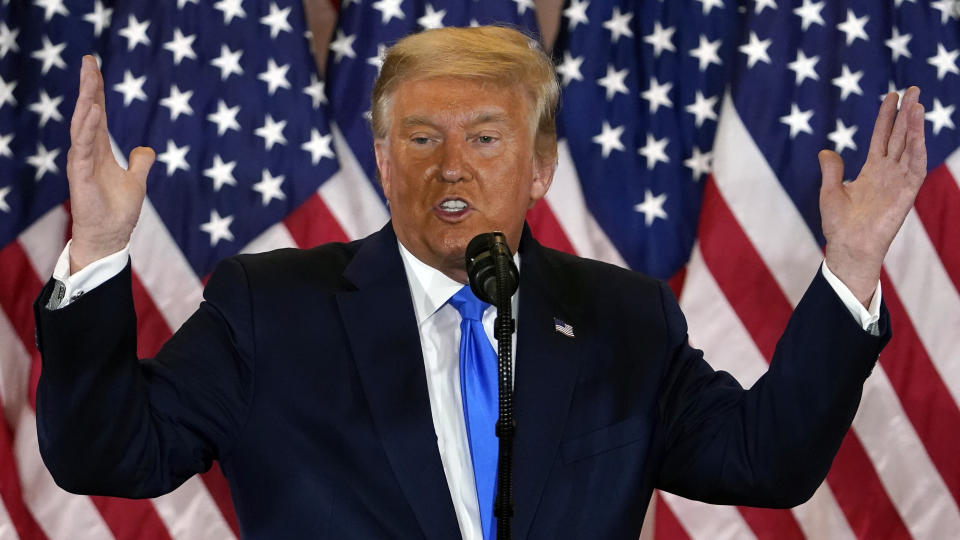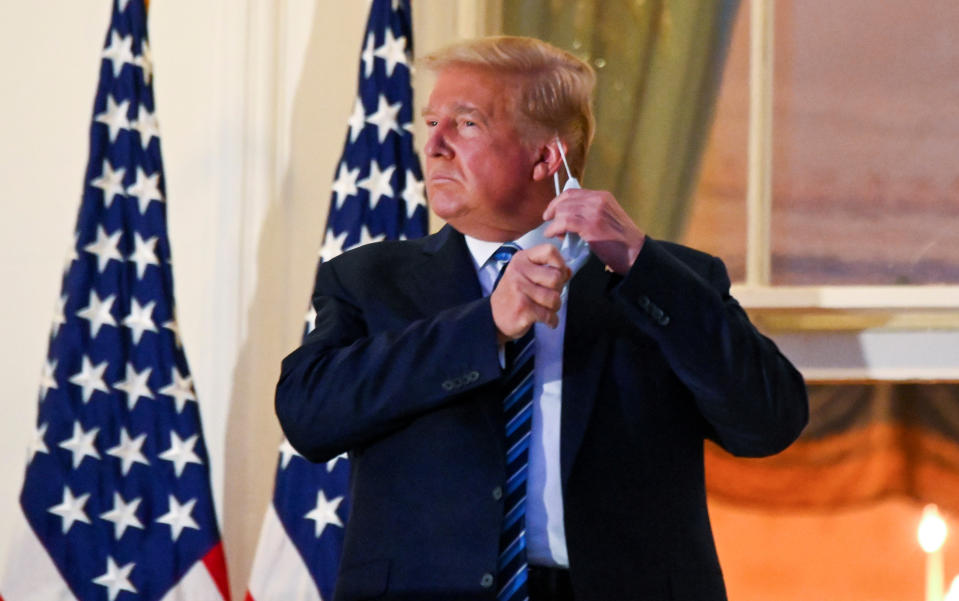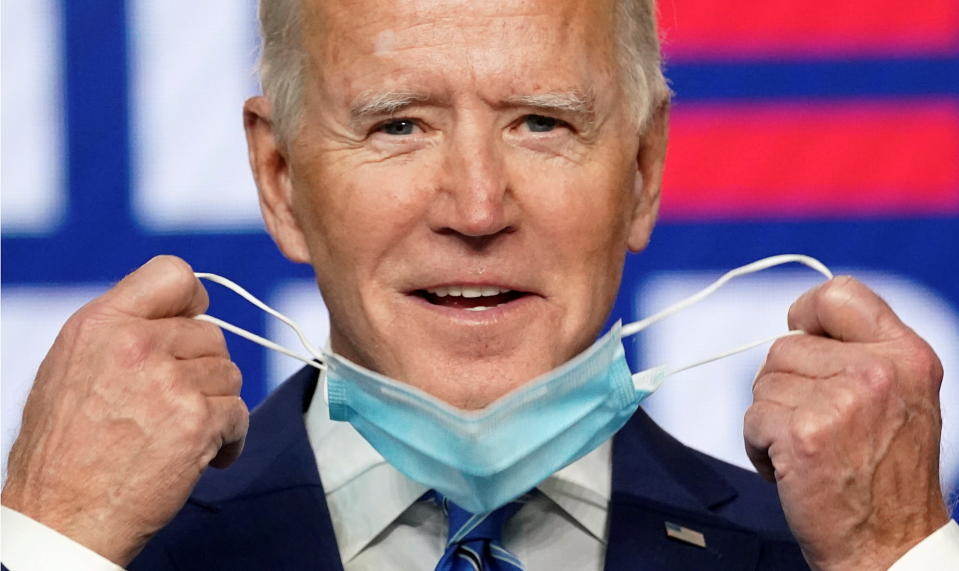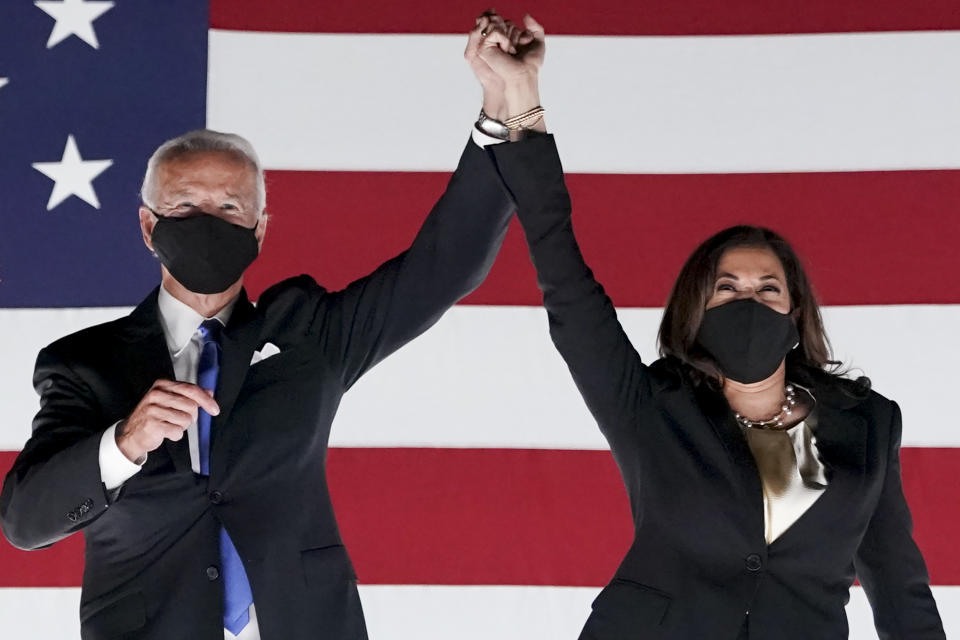Biden defeats Trump to become 46th president

Joe Biden has won the 2020 presidential election, the Associated Press projected Saturday, sending President Trump to a bitter defeat four years after he shocked the world by winning the White House with a victory over Hillary Clinton.
Biden crossed the 270-vote threshold in the Electoral College on Saturday after the AP called Pennsylvania for him. He was also able to capture Wisconsin, Michigan and Arizona, states that Trump carried in 2016.
Other states remain too close to call, and the Trump campaign has filed multiple lawsuits to contest the legitimacy of certain ballots. The fate of those challenges was obscured after Biden was projected to have won the Electoral College.
His running mate, Sen. Kamala Harris, D-Calif., became the first Black woman and first Asian American elected vice president in U.S. history.
"I am honored and humbled by the trust the American people have placed in me and in Vice President-elect Harris," Biden said in a statement. "In the face of unprecedented obstacles, a record number of Americans voted. Proving once again, that democracy beats deep in the heart of America.
"With the campaign over, it’s time to put the anger and the harsh rhetoric behind us and come together as a nation," the president-elect continued. "It’s time for America to unite. And to heal."
He added: "We are the United States of America. And there’s nothing we can’t do, if we do it together."
Biden and Harris were scheduled to address the nation from Wilmington, Del., at 8 p.m. ET Saturday.
Spontaneous celebrations broke out in cities across the country, including New York, Washington, D.C., and Atlanta, as residents took to the streets for impromptu dance parties. Hundreds of anti-Trump demonstrators also gathered in front of the White House, although the president is currently golfing in Virginia.
Pro-Trump rallies also sprung up. In Lansing, Mich., dozens of Trump supporters gathered outside the State Capitol Building, chanting “four more years” about an hour after the race was called.
[Complete live coverage: Reactions to Biden’s victory]
Biden now holds the record for the most number of votes cast for any presidential candidate in history — more than 74 million — shattering the previous mark (69,500,000) set by Barack Obama in 2008. Trump also surpassed Obama’s record, but trails Biden by more than 4 million in the popular vote.
The former vice president, who turns 78 this month, won his bid for the White House on his third attempt, becoming the oldest person ever elected president in the U.S.
Trump, however, signaled that he is not likely to concede defeat anytime soon. Throughout the week, he has continued to make false and unsubstantiated claims about the vote-counting process, offering no evidence to support them.
In a statement released after numerous networks called the election for Biden, Trump vowed to continue fighting the result in court.
"We all know why Joe Biden is rushing to falsely pose as the winner, and why his media allies are trying so hard to help him: they don't want the truth to be exposed." Trump's statement read. "The simple fact is this election is far from over."
“Beginning Monday, our campaign will start prosecuting out case in court to ensure election laws are fully upheld and the rightful winner is seated,” the president continued.
He added: "I will not rest until the American People have the honest vote count they deserve and that Democracy demands."
Trump campaign has yet to provide any evidence of a dishonest vote count.

On Thursday, as it became clear that his early lead was eroding as more ballots were tabulated, Trump posted a dramatic tweet that read, “STOP THE COUNT!”
Then in a White House speech without precedent in American history, Trump flailed at the media, pollsters, election officials, mail-in voting, judges and Democrat-led U.S. cities Thursday evening, as his rival Joe Biden continued to inch toward a win in the 2020 election.
“If you count the legal votes, I easily win,” Trump said, though no state allows the counting of illegally cast votes. “If you count the illegal votes, they can try to steal the election from us.”
The president portrayed the counting of legally cast mail-in ballots as improper — an assault on American democracy by the president himself.
“Our numbers started miraculously getting whittled away, in secret,” Trump said, again without evidence. “This is a case where they’re trying to steal an election. They’re trying to rig an election. And we can’t let that happen.”
[How Biden will govern — if he can govern at all]
Biden’s election was as much about rallying support among Democrats, independents and even some Republicans with a message of unity as it was a repudiation of Trump, whose approval rating, according to Gallup, never hit 50 percent.
In poll after poll leading up to Election Day, large majorities of voters disapproved of Trump’s handling of the coronavirus pandemic, which has killed more than 234,000 Americans and infected more than 9.5 million in the U.S., including him.
Throughout the pandemic, Trump sought to downplay the virus, mocking Biden for wearing a mask and falsely claiming that the United States is “rounding the corner” on the pandemic at a time when cases and deaths from COVID-19 continue to rise. As the race for the White House pushed into October and November, the country set a string of new daily records for coronavirus cases and saw a dramatic spike in states that Trump needed to win to secure his reelection.
After recovering from his own bout with the disease caused by exposure to the coronavirus — which led to a three-day hospitalization and forced the cancellation of one presidential debate — the president returned to the campaign trail in mid-October, holding rallies where he and many of his supporters eschewed the recommendations from public health officials to wear face masks and follow social distancing guidelines.

The Biden campaign offered a sharp contrast, adhering to guidelines from Trump’s own Centers for Disease Control and Prevention, avoiding large rallies and making attendees at campaign events wear masks and follow social distancing guidelines.
Biden overcame numerous attacks from Trump on the campaign trail, including claims of cognitive lapses (Trump branded him “Sleepy Joe”) and questions about his son Hunter’s business dealings in Ukraine and China. Trump even called on Attorney General William Barr to launch an investigation into the Bidens just two weeks before Election Day. (Barr did not.)
Trump, who sought to paint his opponent as a closet socialist being manipulated by the progressive wing of his party, falsely claimed that Biden wanted to “defund” the police and argued that a Biden presidency would “destroy” the suburbs and embrace antifa.
He also floated wild conspiracy theories and disinformation about Biden and other Democratic figures that had been promoted by right-wing activists on social media.
But none of the punches managed to land, infuriating the president and the GOP.
[Trump lost — so what happens to the GOP?]
“If I lose, I will have lost to the worst candidate, the worst candidate in the history of presidential politics,” Trump said at an Oct. 17 campaign rally.
The president also accused Democrats of trying to “steal” the election, falsely claiming that mail-in voting would lead to widespread fraud.
The pandemic caused many states to expand early-voting options, and a record 101 million ballots were cast either in person or by mail before Election Day.
In 2016, Trump won office by riding a populist message against a deeply unpopular establishment candidate in Clinton. But polls showed Biden as far more popular with the electorate than the former secretary of state, giving him more ways to win the election.

Biden, a Scranton, Pa., native, began his presidential campaign in April 2019, joining an already crowded field of Democrats with a video denouncing Trump for his response to the violent white-supremacist rally in Charlottesville, Va., in August 2017. While speaking out against the violent clashes that erupted among white supremacists and counterprotesters, Trump infamously said there were “some very fine people on both sides.”
“With those words, the president of the United States assigned a moral equivalence between those spreading hate and those with the courage to stand against it,” Biden said in the video. “And in that moment, I knew the threat to this nation was unlike any I had ever seen in my lifetime.”
He carried that message into the general election campaign, promising that his election would “restore the soul of the nation.”
Biden shrugged off disappointing performances in early primary and caucus states like Iowa, New Hampshire and Nevada, gaining his footing after a crucial win in South Carolina, where he was buoyed by the support of African American voters wary of the candidacy of Sen. Bernie Sanders, I-Vt., who had emerged as the frontrunner. Biden went on to control of the race, winning 10 of 14 states on Super Tuesday in March. Sanders dropped out of the race and quickly endorsed Biden, paving the way for his nomination.
[Kamala Harris, shattering racial and gender barriers, makes history]
In August, Biden, who had promised to pick a woman as his running mate, announced his choice of Harris shortly before the Democratic convention. The senator from California, who lost her own bid for the 2020 Democratic nomination, had clashed with Biden during the first primary debate by attacking his record on race. But after ending her campaign, she endorsed the former vice president and stumped for him in Michigan ahead of Super Tuesday.
While Biden enjoyed a wave of support among Democrats, he was also backed by “Never Trump” Republicans who opposed the president from the start of his term or became disillusioned by what they considered to be his chaotic and divisive style of governing. During the campaign, Biden was endorsed by dozens of Republican former national security officials, U.S. attorneys and governors, including former Ohio Republican Gov. John Kasich, former Michigan Republican Gov. Rick Snyder, former Arizona Republican Sen. Jeff Flake and Cindy McCain, the widow of the 2008 Republican nominee for president, Sen. John McCain of Arizona.
Biden now faces the enormous challenge of attempting to unify a country deeply divided by partisan politics. While that reality predated Trump’s time in office, it also crystallized over the last four years.

Joseph Robinette Biden Jr. was born in Scranton, Pa., on Nov. 20, 1942, to Catherine Eugenia “Jean” Biden (née Finnegan) and Joseph Robinette Biden Sr. He was raised in Scranton and New Castle County, Del.
Biden studied at the University of Delaware before earning his law degree from Syracuse University in 1968.
He married his first wife, Neilia Hunter, in 1966. They had three children: Joseph R. “Beau” Biden III (born 1969), Robert “Hunter” Biden (1970) and Naomi Christina Biden (1971). A month after he won his first race for the U.S. Senate in 1972, Neilia and Naomi died in a car accident that also injured his sons.
During his six terms in the Senate, Biden commuted by train between his Delaware home and Washington, D.C. — 90 minutes each way.
He met his second wife, Jill, in 1975, and they married in 1977, having a daughter, Ashley, in 1981.
Biden mounted two unsuccessful presidential bids, in 1988 (which was marred by a plagiarism scandal) and 2008 (which he lost to Barack Obama, who ultimately picked him as his running mate).
He flirted with the idea of running again in 2016 but was too grief-stricken over the loss of his son Beau, who died of brain cancer in 2015 at the age of 46.
“Beau should be the one running for president, not me,” he told MSNBC host Joe Scarborough in January. “Every morning I get up, Joe, not a joke, and I think to myself, ‘Is he proud of me?’”
